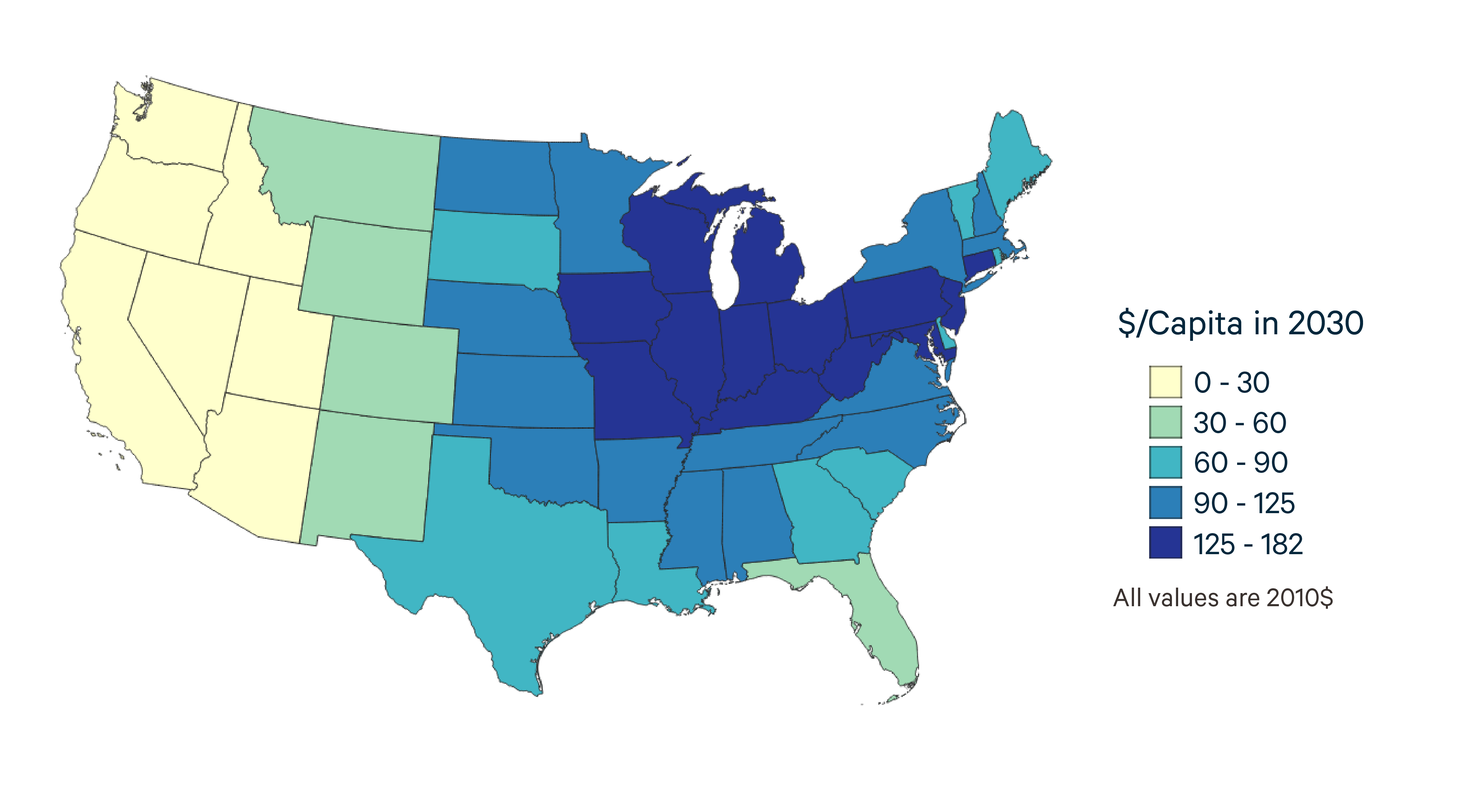Meeting US Climate Goals Would Save Lives, Create $33 Billion in Health Benefits
A new report authored by scholars at Resources for the Future and Harvard University finds that reducing pollution associated with fossil fuel combustion could avoid approximately 3,800 premature deaths in 2030, creating significant health benefits across the country.
A new analysis led by Resources for the Future (RFF) finds that meeting US climate goals would significantly reduce premature deaths associated with poor air quality. While some regions would benefit more than others, the research team estimates that avoiding untimely deaths caused by air pollution would create more than $33 billion in health benefits in 2030 alone.
Reducing carbon dioxide emissions to meet the Paris Agreement goal would also cut the emissions of pollutants responsible for bad air quality and health problems. The new report focuses specifically on “secondary” PM2.5, a particulate matter that is formed when several pollutants associated with the combustion of fossil fuels—sulfur dioxide, nitrous oxide, and ammonia—combine in the atmosphere.
The team analyzed how a drop in secondary PM2.5 would affect health across states, counties, and demographic groups in a future that includes policies like a binding cap on carbon dioxide emissions, sector-specific regulations, and innovation policies in line with US climate goals.
"Achieving climate goals under the Paris Agreement would have substantial global benefits long into the future, but it’s important to also identify the health benefits that result locally and immediately as well,” said Dallas Burtraw, coauthor and RFF senior fellow. “Our research shows that reducing emissions would have public health benefits that are quantifiable and that would touch lives in every state.”
Here are the key takeaways:
- Benefits per capita are greatest in the Midwest but occur all over the country. The Midwest, which has relatively high levels of electricity-sector pollution, would experience the greatest premature mortality reduction per capita. Decline in premature mortality is lowest in the western United States where the electricity sector already runs off a higher percentage of clean energy.
- Meeting US climate goals would create more than $33 billion in health benefits in 2030. This is equivalent to approximately 3,800 avoided premature deaths in that year.
- Most health benefits result from emissions reductions in the electricity sector. This is likely because cleaner electricity would produce less sulfur dioxide and nitrous oxide, key components of PM2.5.
- Premature mortality reductions are distributed evenly across income groups.
- Differences between mortality changes by racial and ethnic groups are influenced by regional population concentrations. The median mortality reduction is at least 15 percent in each analyzed demographic group.

“Not all demographic groups or regions will feel the same benefits of improved air quality, but not all regions and demographics are equally impacted by bad air quality either,” said Jhih-Shyang Shih, coauthor and RFF fellow. “But the lesson holds that all regions, and all kinds of Americans, will see health benefits from cleaning up the energy sector.”
Notably, this analysis does not include benefits related to averted disease, environmental improvements, and premature mortality associated with other pollutants. As a result, the benefits associated with reduced premature mortality from secondary PM2.5 represent only one piece of a pie that likely comprises other important benefits.
For more information about the findings and methodology, please read the associated presentation report, The Distribution of Air Quality Health Benefits from Meeting US 2030 Climate Goals, which serves as the final product of this research.
For more commentary by the authors, read the related blog post, “Meeting the US Nationally Determined Contribution and Saving Lives.” The research was conducted by RFF Senior Fellow Dallas Burtraw, Fellow Jhih-Shyang Shih, Senior Research Analyst Maya Domeshek, Senior Research Analyst Seth Villanueva, and former Harvard University scholar Kathy Fallon Lambert.
Resources for the Future (RFF) is an independent, nonprofit research institution in Washington, DC. Its mission is to improve environmental, energy, and natural resource decisions through impartial economic research and policy engagement. RFF is committed to being the most widely trusted source of research insights and policy solutions leading to a healthy environment and a thriving economy.
Unless otherwise stated, the views expressed here are those of the individual authors and may differ from those of other RFF experts, its officers, or its directors. RFF does not take positions on specific legislative proposals.
For more information, please see our media resources page or contact Media Relations and Communications Specialist Annie McDarris.






